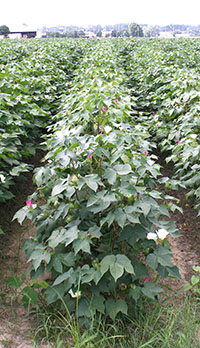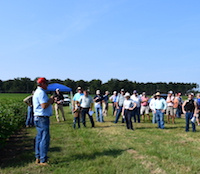Soybeans have been grown in Georgia for livestock feed since the 18th century, and are produced today for cooking oil and animal fodder.
In Georgia, soybeans are not a huge cash crop thanks to the plant's susceptibility to drought and its need for longer periods of nighttime darkness than are typically found in the state. The 180,000 acres that are planted in Georgia each year are mainly used to produce cooking oil, although CAES researchers are busy exploring soybeans' value as an alternative fuel source.
New varieties that are more tolerant of Georgia's growing conditions are also being developed and tested by UGA Extension scientists.
Our Programs and Services
-
Lab Testing and Analysis Services Testing for soil, plant tissue, water quality, animal waste, feeds and forages, pesticides, and much more!
-
On-Site and Telephone Consultation Available in many county offices for ag producers.
-
Pesticide Safety Education Program Topics include pest identification, storage and disposal, pesticide drift and runoff prevention, water quality protection, and food safety.
-
Production Meetings Updates on local issues for growers and producers.
Recent Publications
-
2024 Georgia Ag Forecast Series: 2024 Corn, Soybean, and Wheat Outlook (AP 130-2-06) 1. Tighter margins are expected in 2024 for corn, soybeans, and wheat as commodity prices are forecast to be lower and input prices are expected to be flat. 2. Growing demand for sustainable biodiesel…
-
Georgia Pest Management Handbook Series: Soybean (SB 28-28) Commercial insect and weed control in soybeans. Updated annually.
-
2023 Georgia Ag Forecast Series: 2023 Corn, Soybean, and Wheat Outlook (AP 130-1-06) 1. The Russia-Ukraine war and Mexico’s plan to ban genetically modified corn from the United States will increase uncertainty regarding corn prices. 2. The United States and the world will continue to…
-
Irrigation Reference Guide for Corn, Cotton, Peanuts, and Soybeans (C 1189) A farm’s return on investment is directly affected by the way water is applied to its crops. The wrong end-gun settings can result in overwatering or underwatering large portions of field acres. Clogg…
Websites
UGA-affiliated sites
Soybeans at UGA Provides updated information on all aspects of soybean production, marketing, economics, and outlook.
Commodity Teams at CAES Teams made up of research scientists and extension specialists work together to provide the latest technology and information for efficient, profitable production of some of Georgia's most valuable commodities.
Sustainable Agriculture at UGA Brings together information on sustainable agriculture including crop rotation, cover crops, and other resources.
Institute of Plant Breeding, Genetics and Genomics IPBGG faculty actively engage in training of graduate students, the development of new crop varieties, and basic research on the genetics and understanding of crop traits important to agriculture and human kind.
UGA Department of Agricultural and Applied Economics Learn more about the agricultural and applied economics department at the UGA College of Agricultural and Environmental Sciences.
UGA Department of Crop and Soil Sciences Learn more about the crop and soil sciences department at the UGA College of Agricultural and Environmental Sciences.
-
Parasitic Hijackers Soybean cyst nematodes have evolved to trick plants into diverting resources to support the nutrient demands of the developing nematode.

-
Three products approved New registrations are only for use on dicamba-tolerant cotton and soybeans and will expire in 2025.

-
Midville Field Day UGA agricultural scientists will speak about cotton, corn, peanuts and soybeans research.

| Top Soybean Producers | |
|---|---|
| County Name | Value |
| Macon | $5,247,385 |
| Brooks | 4,954,024 |
| Sumter | 4,482,366 |
| Laurens | 4,046,701 |
| Randolph | 4,013,683 |
| Bleckley | 3,482,050 |
| Jefferson | 3,464,775 |
| Lee | 3,068,055 |
| Washington | 2,931,500 |
| Terrell | 2,783,700 |
| State Total: | $103,229,081 |
|
Displaying farm gate values for 2022. Values are tallied in October for the previous year. |
|
